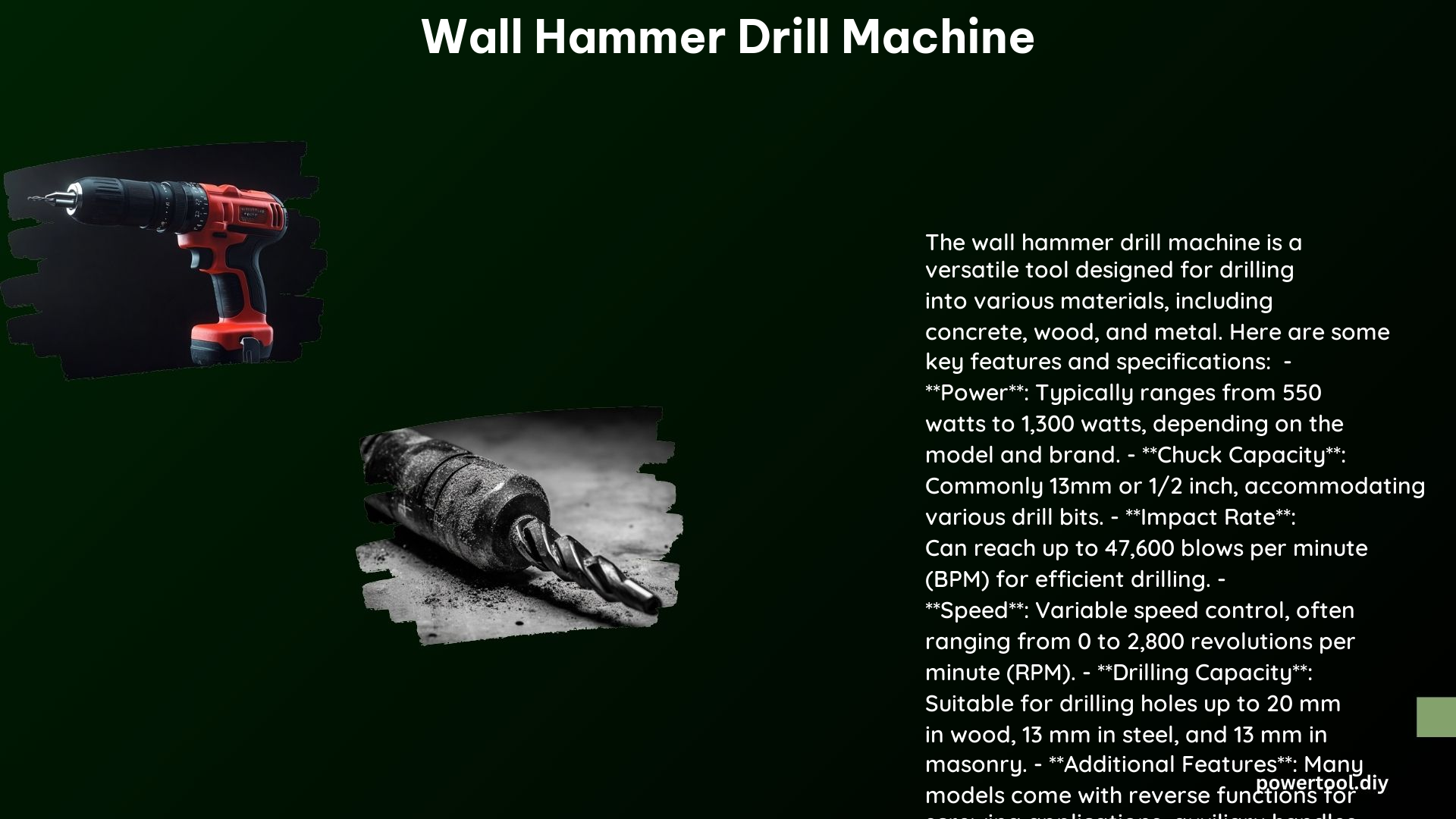Wall hammer drill machines are powerful tools designed to efficiently drill through concrete, brick, and other masonry materials. These specialized drills are essential for a wide range of home improvement, construction, and DIY projects, from installing shelves and hanging heavy items to repairing and renovating walls. In this comprehensive guide, we’ll explore the key features, technical specifications, and best practices for using a wall hammer drill machine to tackle your next project.
Choosing the Right Hammer Drill for Concrete Walls
When it comes to drilling into concrete walls, the power and performance of your hammer drill are crucial. Here are the key factors to consider:
Power and Speed
The power of a hammer drill is measured in watts (W), and the speed is measured in revolutions per minute (RPM) and blows per minute (BPM). For optimal concrete drilling, look for a hammer drill with at least 550 watts of power and speeds up to 2,800 RPM and 47,600 BPM. The Bosch 11255VSR, for example, delivers 8.5 amps of power and can reach speeds of up to 2,900 RPM and 58,000 BPM.
Chuck Capacity
The chuck capacity, measured in millimeters (mm), determines the maximum size of the drill bits you can use. For drilling into concrete, a chuck capacity of at least 13mm is recommended, as it allows you to use larger, more powerful drill bits. The Makita HR2475 has a 13mm chuck capacity, making it suitable for a wide range of concrete drilling tasks.
Impact Rate
The impact rate, measured in blows per minute (BPM), is a crucial factor for effectively breaking through concrete. Look for a hammer drill with an impact rate of up to 47,600 BPM, such as the DeWalt DWD520K, which can deliver up to 48,000 BPM.
Ergonomics and Comfort
Drilling into concrete can be physically demanding, so consider the ergonomics and comfort of the hammer drill. Look for models with auxiliary handles, soft rubber grips, and a well-balanced design to reduce fatigue during extended use. The Hilti TE 2-A22 features an ergonomic design and a vibration-dampening system for improved comfort.
Accessories
A versatile hammer drill should come with a variety of accessories, such as drill bits, depth gauges, and chuck keys, to make your drilling tasks more efficient and convenient. The Milwaukee 2717-20 includes a depth gauge, side handle, and a carrying case for easy transportation and storage.
Using a Regular Drill with a Masonry Bit for Brick Walls

While it is possible to use a regular drill with a masonry bit to drill into a brick wall, it is not the most effective or efficient method. Hammer drills are specifically designed to handle the high torque and impact required for drilling into masonry materials like brick and concrete.
Regular drills may not have the necessary power or speed to effectively drill into these materials, leading to slower progress and potential damage to the drill or the wall. The impact mechanism and higher RPM of a hammer drill are crucial for efficiently breaking through the dense and abrasive nature of brick and concrete.
Choosing the Right Hammer Drill for Different Wall Materials
When selecting a hammer drill for different wall materials, consider the following factors:
Wall Material
Different wall materials, such as concrete, brick, and masonry, require different drilling techniques and tool specifications. For example, a hammer drill with a high impact rate (BPM) is better suited for concrete, while a drill with a lower impact rate may be more suitable for brick or softer masonry.
Hole Size
The size of the hole you need to drill will determine the type of drill bit required. Larger holes may necessitate a hammer drill with a larger chuck capacity, allowing you to use more powerful and versatile drill bits.
Power and Speed
The power and speed of the hammer drill will affect how efficiently it can drill through the wall material. For dense materials like concrete, a more powerful drill with higher RPM and BPM is essential.
Ergonomics and Comfort
When working on extensive drilling projects, the ergonomics and comfort of the hammer drill become increasingly important. Look for models with features like auxiliary handles, vibration-dampening systems, and lightweight designs to reduce fatigue and improve control.
Accessories
Investing in a hammer drill with a variety of accessories, such as a range of drill bits, depth gauges, and chuck keys, can enhance the versatility and convenience of your tool, making it easier to tackle different wall materials and drilling tasks.
Technical Specifications of Wall Hammer Drill Machines
When choosing a wall hammer drill machine, consider the following technical specifications:
| Specification | Description |
|---|---|
| Power | Measured in watts (W), this determines the drill’s ability to handle heavy loads. Look for drills with at least 550 watts of power. |
| Chuck Capacity | Measured in millimeters (mm), this determines the size of drill bits that can be used. A chuck capacity of at least 13mm is recommended for concrete drilling. |
| Impact Rate | Measured in blows per minute (BPM), this determines the drill’s ability to break through masonry materials. Aim for an impact rate of up to 47,600 BPM. |
| Speed | Measured in revolutions per minute (RPM), this determines the drill’s ability to drill quickly and efficiently. Look for drills with speeds up to 2,800 RPM. |
| Weight and Ergonomics | Consider the weight and ergonomic design of the drill, especially if you’ll be using it for extended periods, to reduce fatigue and improve control. |
By understanding these technical specifications and how they relate to different wall materials and drilling requirements, you can make an informed decision when selecting the best wall hammer drill machine for your needs.
